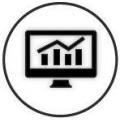Data are the foundations of the social and biological sciences. Familiarizing yourself with a programming language can help you better understand the roles that data play in your field. Learn to develop and train your data skills at the free D-Lab R workshops!
Sign up for our weekly newsletter!
This is an archive of our past training offerings. We are looking to include workshops on topics not yet covered here. Is there something not currently on the list? Send us a proposal.
This four-part, interactive workshop series is your complete introduction to programming Python for people with little or no previous programming experience. By the end of the series, you will be able to apply your knowledge of basic principles of programming and data manipulation to a real-world social science application.
This hands on workshop builds on part 2 by introducing the basics of Python's scikit-learn package to implement unsupervised text analysis methods. This workshop will cover a) vectorization and Document Term Matrices, b) weighting (tf-idf), and c) uncovering patterns using topic modeling.
**Please note: This workshop will be held at the Goldman School of Public Policy at 1893 Le Roy Avenue, Berkeley.**
This workshop will cover how to access databases via RESTful APIs using the Python programming language. Our main example will involve collecting data on news articles through the New York Times Article API.
This workshop will demonstrate the use of the ggplot2 and ggmaps packages for working with and visualizing geospatial data. Participants will learn how to plot points, line and polygon features on a map, customize symbology, and add reference data like Google Maps and OpenStreetMaps. Geocoding place names and addresses with ggmaps will also be introduced.
This workshop will provide a comprehensive overview of graphics in R, including base graphics and ggplot2. Participants will learn how to construct, customize, and export a variety of plot types in order to visualize relationships in data.
Join us as Andrew Garrett discusses his research on linguistic and ethnographic sound recordings from early 20th century California.
This three-part series will cover the following materials:
Part 1: Introduction (Wednesday, March 1)
This hands on workshop goes through the common “preprocessing recipe” that is used as the foundation for a variety of other applications as well as some basic natural language processing techniques. These include: a) digitization (utf 8), b) removal of stopwords, numbers, punctuation, c) tokenization, d) calculation of word frequencies / proportions, e) part of speech tagging, and f) concordan
This workshop will introduce two different web platforms for exploring and mapping U.S. demographic data: SimplyMap and PolicyMap. While there is some overlap between the different applications, each has its own strengths and unique features. For each platform we wil walk through a short demo, followed by some time to explore the data and visualization tools that each platform offers.
Data are the foundations of the social and biological sciences. Familiarizing yourself with a programming language can help you better understand the roles that data play in your field. Learn to develop and train your data skills at the free D-Lab R workshops!
Interested in archival research? Did you know that UC Berkeley Libraries have more to offer than the Bancroft? Join us for a presentation and discussion with Christina Marino the Reference Archivist of the Environmental Design Archives and Jesse Silva the Federal Documents and Political Science Librarian.
It is often said that 80% of data analysis is spent on the process of cleaning and preparing the data. This workshop will introduce tools (notably dplyr and tidyr) that makes data wrangling and manipulation much easier. Participants will learn how to use these packages to subset and reshape data sets, do calculations across groups of data, clean data, and other useful stuff.
This four-part, interactive workshop series is your complete introduction to programming Python for people with little or no previous programming experience. By the end of the series, you will be able to apply your knowledge of basic principles of programming and data manipulation to a real-world social science application.
Part 3 Topics:
This workshop will introduce the plotly Python module and guide attendees from the getting-started phase through the creation of complex, beautiful visualizations that may be shared on the web.
This non-technical workshop provides an overview of computational text analysis methods and tools. No experience in this area is expected or required. The goal is to provide an orientation for those wishing to go further with text analysis and interpret results of these methods.
Git is a powerful tool for keeping track of changes you make to the files in a project. You can use it to synchronize your work across computers, collaborate with others, and even deploy applications to the cloud. In this workshop, we'll learn the basics of understanding and using Git, including working with the popular "social coding" website, GitHub.
Machine learning often evokes images of Skynet, self-driving cars, and computerized homes. However, these ideas are less science fiction as they are tangible phenomena that are predicated on description, classification, prediction, and pattern recognition in data.
Participants in this workshop will learn about some of the issues surrounding the collection of health statistics, and will also learn about authoritative sources of health statistics and data. We will look at tools that let you create custom tables of vital statistics (birth, death, etc.), disease statistics, health behavior statistics, and more. The focus will be on U.S.





